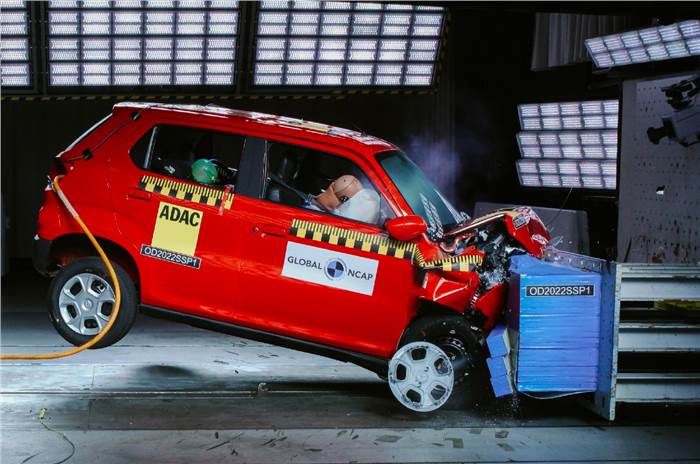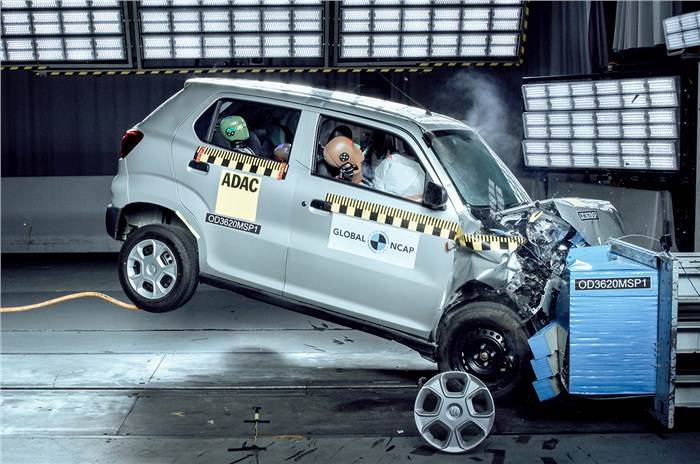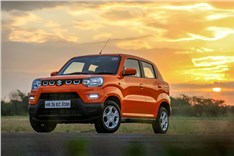The Maruti Suzuki S-Presso for the South African market scored three stars for adult protection in a recently conducted Global NCAP test. This is interesting news as the model is built in India and exported there, while the model built and sold in India scored zero stars in the same GNCAP crash test in 2020.
- South African-spec S-Presso scored 2 stars for child protection
- India-spec S-Presso now gets dual airbags as standard
S-Presso for India vs S-Presso for South Africa
Back in 2020, Global NCAP had noted that the S-Presso’s poor zero-star rating was mainly due to high readings in the neck region of the adult front passenger test dummy. Similar high readings were also recorded for the driver’s as well as passenger’s chest area. In terms of individual crash test scores, the S-Presso for India had scored 0.00 out of 17.00 for adult protection.
The global automotive safety watchdog had also noted poor scores for both the child occupant test dummies in the rear seat. This was attributed to the lack of child restraint systems in the S-Presso for India. The car had secured two stars and 13.84 points out of 49.00 for child protection.
In contrast, the car tested for the South African market secured three stars for adult protection and two stars for child protection. On individual scores, the S-Presso scored 8.96 points out of 17 for adult protection and 15.00 points for child protection.
Global NCAP noted that the protection offered to the driver and passenger dummies’ neck was good, unlike the car tested for the Indian market. The driver and passenger’s chest areas were also rated slightly better than the car tested for India. Both models offered similar protection to the front occupants’ legs.
What could have resulted in different crash test scores?
The India-spec S-Presso in its standard form, in 2020, was equipped with just a driver-side airbag and ABS. Maruti Suzuki did not offer the passenger-side airbag until it was mandated by the government this year. Seatbelt pretensioners are also now a standard fit.
When the 2020 crash test results were released, Suzuki South Africa, in a reply to a tweet, had said that the S-Presso sold in the country was ‘incomparable’ to the one sold in India. Though built in India, the model sold there has had dual airbags and front seat-belt pretensioners as standard since launch.
With no structural differences between both cars, the South African-spec model’s better performance could be explained by the inclusion of seatbelt pretensioners, which prevent violent forward movement of the occupants, as well as the passenger side airbag. There is also no difference between the crash test protocols for both the Safer Cars for India and Safer Cars for Africa campaigns.
GNCAP testing protocols to get more stringent
GNCAP is all set to introduce a more enhanced testing protocol from July. For cars to achieve a 5-star safety rating, they will have to be mandatorily subjected to side impact tests and will also require the standard fitment of ESC. Additionally, the cars will have to comply with pedestrian protection measures as per UN requirements.
The new norms state that even if a car scores multiple stars, in case the dummy reading shows a poor protection for a vital body part, the car will get only one star regardless of the overall points.
Moreover, India-specific crash tests will be conducted under Bharat NCAP which will roll out from April 1 next year.
Also see:
Kia Carens scores 3-star Global NCAP safety rating







Comments
Member Login
Personal Details
No comments yet. Be the first to comment.